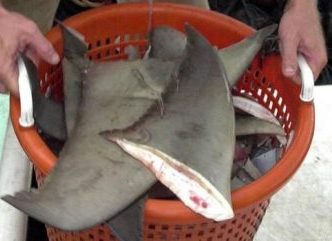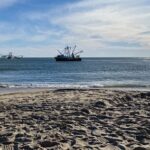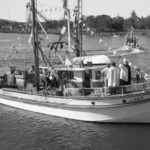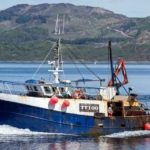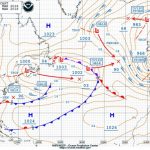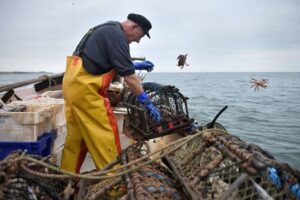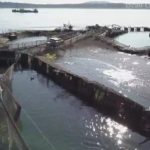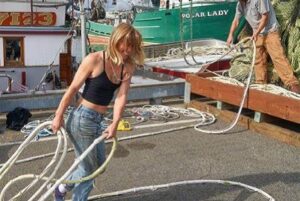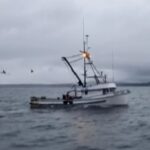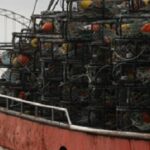Tag Archives: Bill Kelly
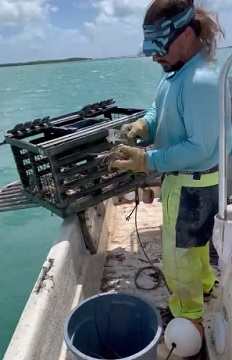
Commercial Lobster Season off to a Good Start as Keys Fishermen Deal with Increased Materials and Gas Prices
The Upper Keys boats have been “killing it,” with lobsters spilling out of containers onto decks, crews have been coming back to the docks earlier in the day due to lack of storage on the boats. However, in the Middle and Lower Keys, less product is being found. But this year, no matter how many “bugs” are hauled in, the chatter among all the boats is that overhead is biting into profits and thank goodness, the Chinese are buying. “The harvest is OK. Not fantastic, but it’s good,” George Niles told Keys Weekly. He has been fishing out of Stock Island for 50 years. “But we’re getting two dollars less per pound than this time last year. Traps are $50 to $60 apiece, compared to $35 three years ago. And fuel is $2 more than when Biden was elected. And that’s pure profit.” >click to read< 08:43
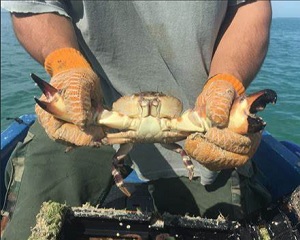
Keys Stone Crab: High Demand and Low Supply Equals Big Money
As one commercial fisherman colorfully put it, “I could catch more crabs on Duval Street right now than in the Florida Bay.” Understandably, Bill Kelly, the executive director of the Florida Keys Commercial Fisherman’s Association, expressed himself in a more understated way. “It’s not overwhelming, I can tell you that,” he told Keys Weekly about the 2021 stone crab harvest’s first weekend. Gary Graves, vice president at Marathon’s Keys Fisheries Market & Marina, which buys stone crabs from the commercial fisherman then sells them to the public, is a little more blunt. >click to read< 10:03
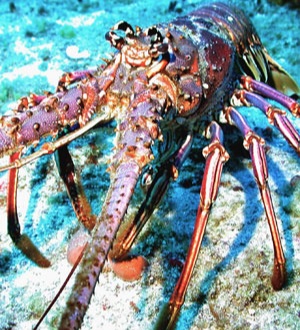
Florida Spiny lobster season ends
Bill Kelly says the spiny lobster fishery is like real estate. “Location is everything,” said Kelly, executive director of the Florida Keys Fishermen’s Association. “We’re seeing a significant season, a good season for spiny lobster and stone crab harvest in the Upper Keys and [mainland] South Florida. We’re also seeing that in the extreme Lower Keys and down into the Marquesas and the Tortugas.” The lockdowns in China early during the pandemic didn’t help the industry either. Kelly said China buys about 80% of the live spiny lobsters, and they pay top dollar. >click to read< 11:39
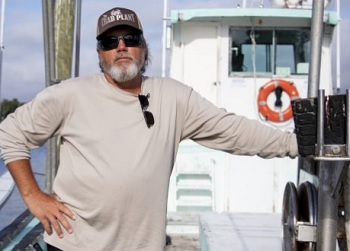
After Proposing A Five-Week Cut, Florida Cuts Stone Crab Season By Two Weeks
After originally threatening to shorten the stone crab season by five weeks, the commission conceded to complaints in a virtually held meeting on Wednesday and shortened the season by only two weeks, with a new end date of May 1. The new rules go into effect Oct. 1. The commission finalized its rules after hosting a series of virtual workshops since June with industry stakeholders, who widely criticized the agency’s original proposals. On Wednesday, commissioners acknowledged that the new rules, even with a May 1 end of season, would succeed in keeping more than 300,000 pounds of stone crabs from being harvested, which should surpass the agency’s goal of saving 1 million pounds of stone crabs from harvest over a five-year period. >click to read< 07:58
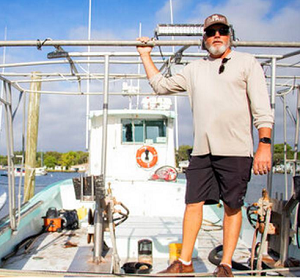
“I’m in fear of my livelihood,” “They really don’t listen to us.” Florida shortens stone crab season over industry objections
The Florida Fish and Wildlife Conservation Commission said the shortened season and other new limits are necessary to sustain Florida stone crabs,,, The agency’s scientists said many crabs don’t survive their claws being removed, and crabs have been overharvested since the late 1990s. Its data, challenged as inaccurate by the industry, showed the fewest pounds of stone crab claws harvested since 1986 during the season that ended last year. Wholesale claw prices in some areas have tanked from low demand, as diners avoid restaurants and consumers reduce spending amid concerns about the economy. The commission said Gov. Ron DeSantis may reduce the amount of money crabbers must pay for next season’s trap certificates as part of a crab-industry bailout related to the virus. >click to read or listen< 15:14
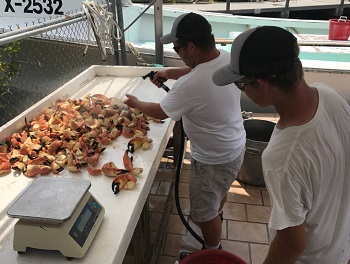
First a hurricane, then an algae bloom. Now Keys fishermen try to weather the coronavirus pandemic
This day’s haul was a good catch — hundreds of claws ranging in size from large to “colossal.” But this was among the last trips the crew of the Risky Business II will make this season to harvest the Florida delicacy. With restaurants mostly closed due to the coronavirus pandemic, Piton and most other Keys commercial anglers are calling it an early season, which is scheduled to end May 10. Piton, 54, has been in the lobster and crab business for nearly 40 years and is among the most successful operators in the Keys. He said he’ll be able to weather the pandemic, but he feels for the many other commercial anglers who won’t. video, >click to read< 10:37
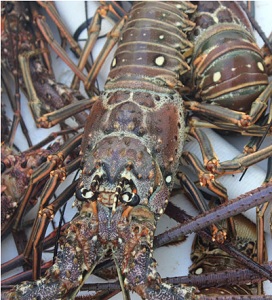
Coronavirus: Florida Keys Spiny Lobster Fishing Industry Hit Hard
Spiny lobster is Florida’s most valuable seafood. But the fishermen in the Keys were already having a lousy year. Then came the coronavirus. “The price crashed $4 in a day,” said George Niles, who fishes out of Stock Island. Bill Kelly from the Florida Keys Commercial Fishermen’s Association said the price went from about $10.50 a pound off the boat to $6. >click to read< 19:22
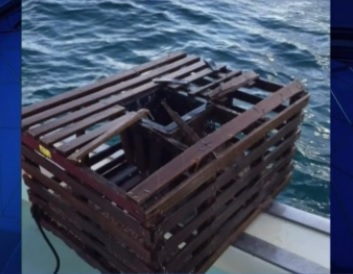
Florida Keys Eight no-fishing zones proposed in the Keys to protect threatened corals and marine life
Federal environmental regulators Tuesday unveiled major new proposals to protect marine life and corals that would limit fishing, restrict what cruise ships can dump at sea and regulate the boats on which many people live near shore.,,, And in a move that will likely cause controversy in the fishing industry, NOAA, the federal agency that oversees the waters surrounding the island chain, called for adding eight more zones in Keys waters where both commercial fishing) and recreational angling would be prohibited. >click to read< 10:12
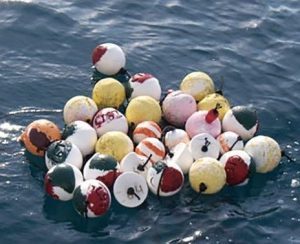
Florida Commercial fishermen can apply for Hurricane Irma assistance
Twenty-one months after Hurricane Irma, the funds are in place to begin restoring the losses of commercial fishermen in the Keys. The Florida Wildlife Commission has $44.6 million that will be available for marine fisheries assistance. The first step, according to the state agency, is for commercial fishermen to register in two places: Commercial fishermen — from coastal counties in Florida from Dixie County to Monroe County on the west coast and Nassau County to Miami-Dade County on the east coast — are urged to complete these steps by July 10, 2019. >Click to read<12:08
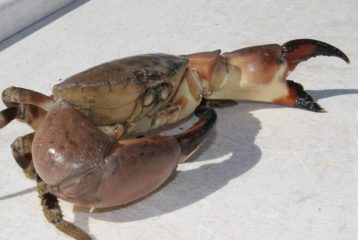
How was the stone crab season? Good in the Keys, but rough in other parts of Florida
Florida Keys and Miami fishermen fared much better than their colleagues on the west coast of the state during this year’s stone crab season, but production varied depending on where they fished in South Florida, the head of the Keys commercial fishing trade association said. Wednesday was the last day of the eight-month season, which began in October. “Supply was good, prices were high and demand was strong,” said Bill Kelly, executive director of the Florida Keys Commercial Fisherman’s Association. But a persistent red tide algae bloom that plagued the Gulf>click to read<16:48
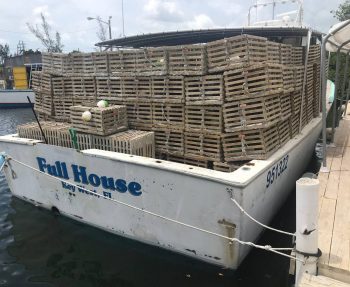
China bought lots of Florida lobster despite tariffs. Keys fishermen paid the price
Chinese importers bought Florida spiny lobsters in what could be near-record numbers this season, despite a 25 percent tariff their government placed on U.S. seafood last July, according to the leading Florida Keys commercial fishermen’s trade group. That’s great news considering the fear commercial anglers had about the potential impact of growing U.S.-China trade hostilities on one of South Florida’s largest industries. “Going into the season, the big questions were: Will the Chinese buy? How much and at what price,” >click to read<20:25
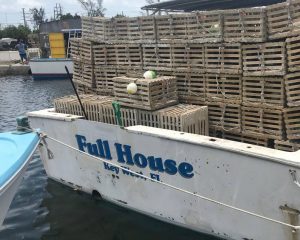
Where did all the lobsters and stone crabs go? How the fishing industry is bouncing back
The red tide algae bloom plaguing Southwest Florida hasn’t hit the Florida Keys. And Hurricane Irma happened more than a year ago. But they’re both affecting the island chain’s commercial fishing industry. That’s a crucial impact because the industry is the second-largest stand-alone economic generator in the Keys next to tourism. Fishing is estimated by the Florida Keys Commercial Fishing Association to bring in about $900 million a year to the Monroe County economy. That includes transactions such as fuel sales, dockage fees, and boat and engine repairs. >click to read<18:13
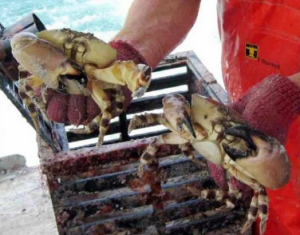
Stone crab season off to promising start in Florida Keys
The state’s stone crab fishery should expect to take a hit this season from the red tide algae bloom that’s been plaguing Florida’s west coast for months, but the Keys, which accounts for 65 percent of the harvest of the sought-after claws, does not appear to be affected. The eight-month commercial season began Monday, with fishermen pulling traps that have been soaking for the past 10 days. Monday afternoon, boats were still coming back from the water, but Bill Kelly, executive director of the Florida Keys Commercial Fishing Association, said captains were reporting a promising first day. >click to read<20:58

How stone crab season survived a hurricane
The lobster season ended for many before it really had much of a chance to begin. But for those who fish both stone crabs and lobster, high market prices for stone crabs and steady production this season, which ends this week, was what they needed to stay afloat after Irma. The hurricane had displaced or destroyed anywhere from half to a third of the 350,000 lobster traps fished in the Keys during the season that runs from Aug. 6 to March 31. “It wasn’t a great season, and it wasn’t a terrible season,” George Niles, Lower Keys commercial trap fisherman said,,, >click to read<16:46
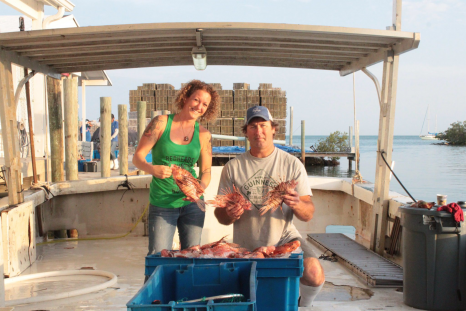
Keys fishermen talk about traps to stop the lionfish invasion
Lionfish are the scourge of the Florida Keys seas. Since the early 2000s, they’ve been invading local waters, devouring everything in sight.,,, It’s legal to net them, even spear them where it’s allowed.,, But the simplest, most effective method for removing lionfish is to catch them in existing lobster and stone crab traps.,, The Florida Keys Commercial Fishermen’s Association is tackling the lionfish invasion from another angle — an exempted fishing permit issued by the National Oceanic and Atmospheric Administration for a pilot project. >click to read< 18:53
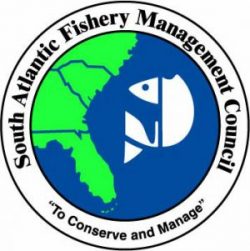
“We live and die by stock assessments,” – Fishermen seek more responsive regulations
“We live and die by stock assessments,” said Jimmy Hull, a commercial fisherman from Ormond Beach, Fla. His statement during an informal question-and-answer period held by the South Atlantic Fishery Management Council is part of an overall grievance a significant number of fishermen have with the fishery management process — that it’s not responsive to current conditions in fish stocks, and instead responding to conditions months or years earlier. >click to read< 08:46
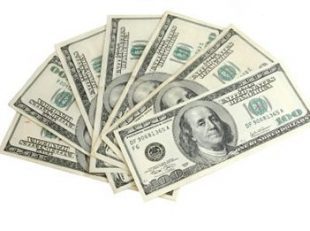
Florida commercial fishermen could get $200 million in aid
Florida’s commercial fisheries, hit hard by Hurricane Irma, should pull in a $200 million boost from the two-year federal budget passed last week. The $200 million will be included as funding for the “catastrophic regional fishery disaster for Florida” in the proposed $300 billion increase in the federal budget, Florida U.S. senators Bill Nelson and Marco Rubio announced. Part of that federal money could go toward ongoing trap-recovery efforts, Florida Keys Commercial Fishermen’s Association executive director Bill Kelly said Monday. >click to read< 19:29 
Hurricane Irma cuts Florida lobster harvest by half
 A fresh catch of spiny lobster arrives dockside. But for marina owner Gary Graves, this delivery is too little, too late. “Basically, lobster fishing is pretty much over for us this year,”said Graves, who is vice president of Keys Fisheries wholesaler. Graves says Hurricane Irma dealt a severe blow when it hit Florida in September. Leaving a trail of wreckage on land, the storm also came just a month into lobster harvesting season. “We’re going to probably end up maybe 50 percent of a normal season the way it looks right now,” he said. click here to read the story 11:19
A fresh catch of spiny lobster arrives dockside. But for marina owner Gary Graves, this delivery is too little, too late. “Basically, lobster fishing is pretty much over for us this year,”said Graves, who is vice president of Keys Fisheries wholesaler. Graves says Hurricane Irma dealt a severe blow when it hit Florida in September. Leaving a trail of wreckage on land, the storm also came just a month into lobster harvesting season. “We’re going to probably end up maybe 50 percent of a normal season the way it looks right now,” he said. click here to read the story 11:19
Florida Keys seafood industry begins gear recovery after Hurricane Irma
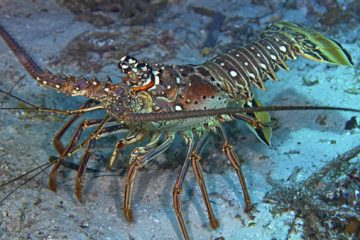 To find the lobster, Florida Keys commercial fishers must first track down gear scattered or destroyed by Hurricane Irma. “Just like on shore, the underwater has patterns of destruction,” Bill Kelly, executive director of the Florida Keys Commercial Fishermen’s Association, said Thursday. “Some areas have suffered major devastation, really hard hit,” he said. “Other areas are not so bad.” One large Middle Keys family operation estimates having lost 6,000 traps, Kelly said. click here to read the story 11:00
To find the lobster, Florida Keys commercial fishers must first track down gear scattered or destroyed by Hurricane Irma. “Just like on shore, the underwater has patterns of destruction,” Bill Kelly, executive director of the Florida Keys Commercial Fishermen’s Association, said Thursday. “Some areas have suffered major devastation, really hard hit,” he said. “Other areas are not so bad.” One large Middle Keys family operation estimates having lost 6,000 traps, Kelly said. click here to read the story 11:00
Trap fishermen, industry suffers record loses from Irma
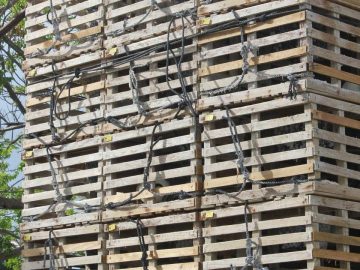 Conch Key commercial fisherman Gary Nichols scoured the Atlantic Ocean for seven hours on Monday and only found 15 of his 5,000 spiny lobster traps. Fellow Conch Key fishermen Jeff Kramer was only able to locate a handful of his 2,000 traps he had placed in the Atlantic. Both are hoping that ones in the Gulf of Mexico fared better. Nichols’ daughter Kelly Cordova Nichols was able to locate 160 of the family’s 1,500 traps in the bay. Nichols and his daughter are also working with two boats that were damaged by Hurricane Irma and are “not properly operating.” “I feel a little bit defeated,” Nichols said. “It’s hard to keep focused and have a firm belief in God and happiness right now. click here to read the story 16:05
Conch Key commercial fisherman Gary Nichols scoured the Atlantic Ocean for seven hours on Monday and only found 15 of his 5,000 spiny lobster traps. Fellow Conch Key fishermen Jeff Kramer was only able to locate a handful of his 2,000 traps he had placed in the Atlantic. Both are hoping that ones in the Gulf of Mexico fared better. Nichols’ daughter Kelly Cordova Nichols was able to locate 160 of the family’s 1,500 traps in the bay. Nichols and his daughter are also working with two boats that were damaged by Hurricane Irma and are “not properly operating.” “I feel a little bit defeated,” Nichols said. “It’s hard to keep focused and have a firm belief in God and happiness right now. click here to read the story 16:05
Bill Kelly, Florida Keys Commercial Fishermen’s Association, to lobby against annual catch limits at “Managing Our Nation’s Fisheries” Conference
keysnews.com – “I’m going to address annual catch limits, and their effects on the commercial fishing industry,” Kelly said. “We want to make sure fishery management is based on sound science.” continued






